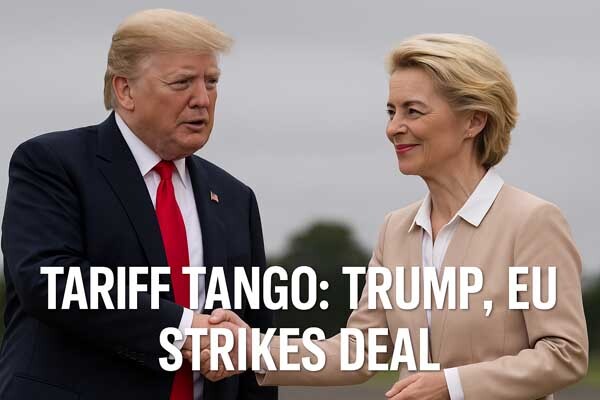 News Staff
News Staff![]() -
July 27, 2025 -
Business -
President Trump
European Commission President Ursula von der Leyen
-
1.7K views -
0 Comments -
0 Likes -
0 Reviews
-
July 27, 2025 -
Business -
President Trump
European Commission President Ursula von der Leyen
-
1.7K views -
0 Comments -
0 Likes -
0 Reviews

DLNews Business
EU Tariff Tango: Trump, EU Strike Trade Deal Framework with Big Promises and Local Ripples
In a dramatic turn of events on Sunday in Turnberry, Scotland, President Donald Trump announced a sweeping framework agreement with the European Union that could redefine transatlantic trade. Flanked by European Commission President Ursula von der Leyen, Trump outlined a deal featuring a uniform 15% tariff on all EU imports to the United States, ending months of tension that threatened to spiral into a full-scale trade war.
“We are agreeing that the tariff straight across for automobiles and everything else will be a straight-across tariff of 15%,” Trump said. The agreement replaces the previous 10% baseline and averts a planned hike to 30% on August 1. While the pact is still in its framework stage, both leaders heralded it as a stabilizing force.
Von der Leyen, speaking candidly, admitted negotiations were “very tough,” but praised the result. “We came to a good conclusion for both sides,” she said. “It will bring stability. It will bring predictability. That’s very important for our businesses on both sides of the Atlantic.”
Under the new deal, the EU has committed to purchasing $750 billion worth of American energy and to investing an additional $600 billion in the U.S. economy—figures that Trump described as “the biggest deal ever made.” He also noted the EU will be opening its markets for zero-tariff trade on many fronts and is agreeing to buy significant quantities of American military equipment.
Commerce Department data underscores the scale of the relationship: last year alone, U.S.-EU trade in goods totaled $975 billion. Pharmaceuticals remain a flashpoint. Despite their being the No. 1 import from the EU to the U.S. ($92.1 billion), Trump excluded them from the deal. “Pharmaceuticals are very special. We can’t be in a position where we’re relying on other countries,” he said, again threatening a future 200% tariff on foreign-made drugs.
For the Coachella Valley and greater Southern California economy, the deal’s impact could be significant. The region’s logistics sector, which benefits from trade through ports in Los Angeles and Long Beach, may see a surge in EU goods routed through local distribution centers, boosting warehouse employment. On the other hand, any shake-up in pharmaceutical pricing or availability could affect the valley’s large retiree population, many of whom rely on affordable imported medications.
Agricultural producers in Riverside County, who have often been hit by retaliatory EU tariffs in the past, are cautiously optimistic. A more stable trade environment with the EU could open markets for specialty crops like table grapes, citrus, and dates—many grown in the eastern Coachella Valley.
Still, uncertainty lingers. The framework is not a finalized treaty, and several key sectors, including semiconductors and metals, remain in limbo. Commerce Secretary Howard Lutnick warned that new tariffs on semiconductors will be announced within two weeks, adding, “August 1, the tariffs are set. They’ll go into place.”
For now, the handshake deal offers breathing room. But as with any Trump-era agreement, the real measure will come in the enforcement—and in the details yet to be hammered out.

Desert Local News is an invitation-only, members-based publication built on fact-checked, non-biased journalism.
All articles are publicly visible and free to read, but participation is reserved for members—comments and discussion require an invitation to join.
We cover local, state, and world news with clarity and context, free from political agendas, outrage, or misinformation.